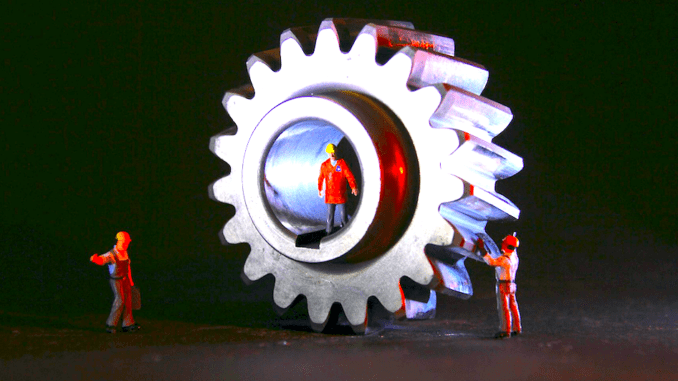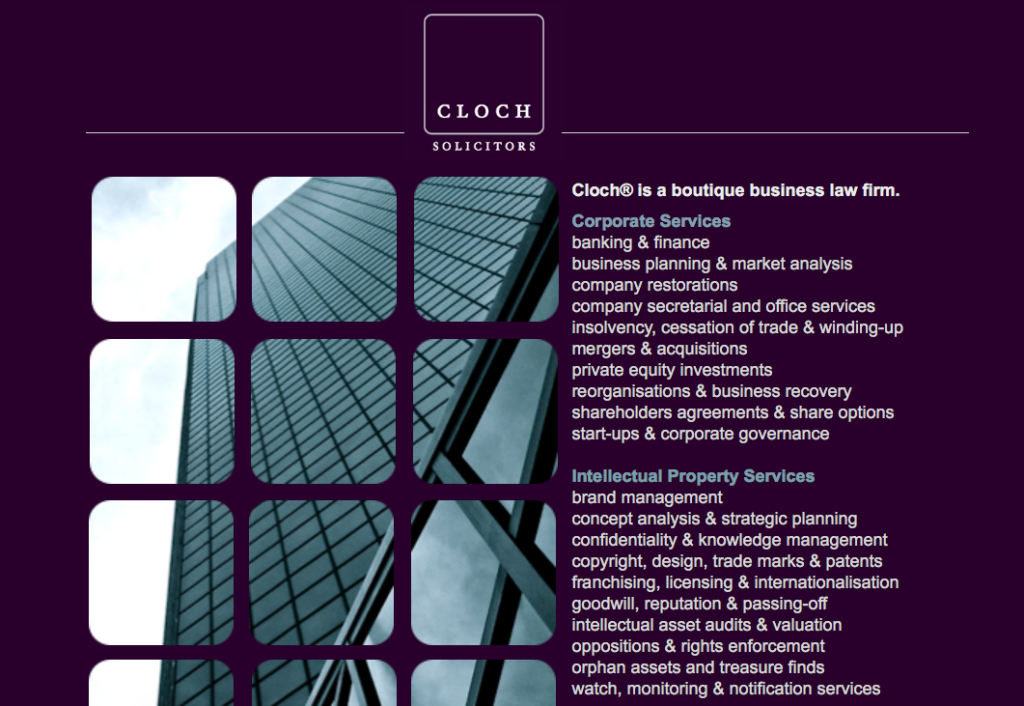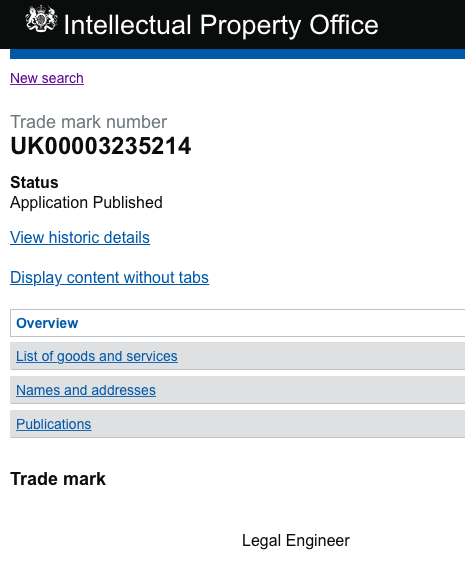
Philip Hannay, a lawyer at Cloch Solicitors in Scotland, has applied to trademark the term ‘legal engineer’, setting off a chorus of comment from the legal tech community and on social media around the world.
The application has also started something of a wild goose chase (see more below) as to who originally coined the specific two-word term ‘legal engineer’.
Most of the recent comment on social media has been opposed to the idea of trademarking the term, even if just in the UK. However, Hannay, who is a Managing Director at Cloch Solicitors, and has a strong interest in technology issues, told Artificial Lawyer today (7 Dec, 2017) that he had made the application back in June 2017.
Hannay said: ‘I filed the application in my name on 05 June 2017, over 6 months ago. It has not been formally opposed to date.’
The experienced lawyer also noted to Artificial Lawyer that despite some evidence of opposition informally made, that ‘neither of the two parties which threatened opposition over the last two days after the swell in social media attention have made contact (before or after making threats) to explain their reason for doing so’.
He added that, to paraphrase, he was not exactly too happy with the way things have gone in social media land in relation to his legal right to trademark the term, which currently has the status of ‘application published’.

Artificial Lawyer is not an IP specialist and so will stay out of the legal issues. Instead the other interesting question here is: who first coined the phrase ‘legal engineer’ and what does it mean in today’s context of legal process improvement and legal design?
Professor John Flood very kindly helped by pointing out that US law professor, Ronald Gilson, back in 1984 coined the term ‘transaction cost engineer’ to refer to the economic and legal input commercial lawyers made in areas such as M&A.
However, Gilson’s main thrust was not really about legal engineering as we’d view it today, but rather how a lawyer who is mainly giving non-legal business advice and support to enable an M&A transaction to happen, adds value to the process (see notes below for those with an academic interest).

So, it wasn’t really Gilson. But then, of course, it naturally had to be legal tech guru, if not founding father of modern legal tech, Richard Susskind.
Artificial Lawyer chatted with Susskind via social media and to everyone’s surprise, the answer came back: Nope, I didn’t invent that specific term either, at least not in the context of how people use it today in relation to the improvement of legal processes with technology.
Susskind wrote to Artificial Lawyer the following: ‘The terms I used were ‘legal knowledge engineer’ in my doctorate (1986) and in my book ‘Expert Systems in Law’ (1987) and ‘legal information engineer’ in my book, ‘The Future of Law’ (1996).’
He added – and this is crucial here – that: ‘My uses may have been more specific – the legal knowledge engineer being the person who represents law in expert (AI) systems, and the legal information engineer as the person who structures and organises the content for online legal services.’
In other words, those uses don’t match up exactly with today’s use of the term ‘legal engineer’ either.
Which means…..as far as Artificial Lawyer can see there is no specific person who can lay claim to creating the term ‘legal engineer’ at present.
In part this is because a blend of Gilson, Susskind and a mass of others have added their views and interpretations to the term, shortened it and now we have today something that neither of the above gurus had in mind back in the 1980s and 1990s.
For Artificial Lawyer the term legal engineer means this: ‘A person (lawyer or not) who improves a legal process or the delivery of legal services by leveraging legal technology and legal data.’
I.e. it’s basically an engineer one would find in a car factory, but with the bit about helping to improve the process of making cars replaced with helping to make legal goods and services.
That said, history can change. So, if there is anyone out there who wants to claim they coined the term ‘legal engineer’ in today’s context, then please say and it will be attributed to you…..
…..and to that end, two very respected and well-known members of the legal tech community, Catherine Bamford of BamLegal and Stuart Barr of HighQ, have since last night added some very interesting extra detail that picks up from where Susskind left off.
Bamford notes that UK law firm, Pinsent Masons, which has long had an interest in legal process improvement used the term ‘legal knowledge engineer’ at least as early as 2014, if not before.
Bamford wrote: ‘When the team grew at Pinsents from just focusing on doc automation to working on legal process mapping and assisting Orlando [ Orlando Conetta, Head of R&D at Pinsent Masons ] and his team with TermFrame [the firm’s AI project] we needed a job title for our new recruits that encompassed it all. We decided on Legal Knowledge Engineer, the term used by Susskind.’
However, Bamford later created her own business back in the summer of 2014.
‘When I left and set up on my own I dropped the word ‘knowledge’ as a lot of what I do re-engineers the process of delivering law as well as coding the content or true ‘legal knowledge’, hence my company name, registered over 3 years ago now, Bamford Legal Engineering (BamLegal for short),’ she added.
Though, Bamford also notes that on her LinkedIn page her job role is still listed as a ‘legal knowledge engineer’, rather than specifically a ‘legal engineer’.
But, there is more.
Stuart Barr of HighQ notes that he wrote an article about legal engineers in July 2016 (since re-dated to Sept 2017). This article’s title is ‘The Rise of the Legal Engineer’. Barr also importantly defines the term as he sees it. We won’t re-quote the whole article (please check it out…) but here are some key points:
‘This role [of a legal engineer] is the interface between legal experts and technology experts – they get both sides of the equation. There are typically two routes into this role: from the legal side or from the tech side.
Sometimes legal engineers are technologists who become familiar with legal processes….Other times, legal engineers can be lawyers (or ex-lawyers) who are technologically adept and see the opportunity to improve legal processes with the intelligent use of technology.
The important thing is that they have a deep understanding of both technology and legal practice and an appetite to drive innovation, efficiency, process improvement and client engagement,’ Barr adds in his piece.
Not long after, Drew Winlaw of Wavelength.law, which is both a law firm and a legal tech consultancy, and which explicitly uses the term ‘legal engineers’ in its marketing content to describe what it does, also wrote a piece on the subject.
Winlaw’s piece was titled, ‘Are You a Legal Engineer?’ and is dated August 2016. In this piece he says he realised that he was a legal engineer and it changed his life.
‘Identifying myself as a legal engineer was something of an epiphany. I recognised many of the new law firm roles predicted by Richard Susskind in his book The End of Lawyers?. In time I gravitated away from practising as a lawyer towards troubleshooting and fixing processes for legal teams and the teams that support them,‘ he wrote.
And, over the weekend Artificial Lawyer received some more information, which is outlined below.
One reference that had been overlooked was a book by Cambridge Professor, David Howarth, who was also a former Liberal Democrat MP. His book, ‘Law as Engineering‘ , first appeared on Amazon in 2013, but which seems to have been more widely reviewed not until 2014 when the Law Society Gazette and others got hold of it.
Initially, Artificial Lawyer thought the Holy Grail had been found. Surely this is it….! But, alas, no. Although it comes very close, in that Howarth draws the parallel between the process of legal work and the processes of working as an engineer, this does not – at least from the visible review pages available on Amazon – appear to be primarily about the use of legal technology to change legal processes. It’s more of a philosophical work, drawing intellectual parallels between the logical techniques of the law and the industrial world, with much focus on legal ethics, which is indeed fascinating, but still far from today’s tech-based use of the term ‘legal engineer’.
But….to quote Master Yoda: ‘There is another.’
Scottish law firm, Inksters, has also reached out to Artificial Lawyer to mention that one of its staff, Michelle Hynes, has been using the term ‘Legal Process Engineer’ since 2014.
While in an article later that year she mentioned in an interview the use of the specific two-word term ‘legal engineer’. And, it would seem, that this term was used in today’s context of law, process and technology. That article was in November 2014 and titled ‘The Process Engineer’s Tale.’
So, where does that leave us? The answer is that there is no perfect answer here. But we have certainly got a lot closer to the origin. Despite the above, it’s still not 100% clear when the wider legal tech community started saying ‘legal engineer’ and when this came to mean the above.
However, it certainly is fair to say this evolution of the term took place between around 2014 and 2016 and that pioneers such as Bamford, Barr and Winlaw – and Hynes – were very much part of this etymological change if not actually responsible for it, not to mention actually ‘practising what they preached’ in terms of being legal engineers.
What this also shows is that there was, and still is, a community of people identifying with the term legal engineer for several years now.
In the meantime, the term is in the process of becoming trademarked, at least in the UK. What that actually will all mean globally, remains to be seen. But thanks to Philip Hannay for starting the debate. It’s been interesting….and looks set to run for a while.
In 1984 Ronald Gilson published Value Creation by Business Lawyers: Legal Skills and Asset Pricing. It began: ‘What do business lawyers really do? Embarrassingly enough, at a time when lawyers are criticized with increasing frequency as nonproductive actors in the economy, there seems to be no coherent answer.’
Gilson concluded that lawyers add value as ‘transaction cost engineers’, says George W. Dent in a 2009 paper, link here. (Dent also outlined the quote above.)
Other links kindly provided by Prof John Flood on this subject include:
https://www.jstor.org/stable/796226?seq=1#page_scan_tab_contents
http://scholarship.law.upenn.edu/cgi/viewcontent.cgi?article=2573&context=faculty_scholarship
(Prof Flood also mentioned the Howarth book via Twitter, but I missed it.)
3 Trackbacks / Pingbacks
Comments are closed.